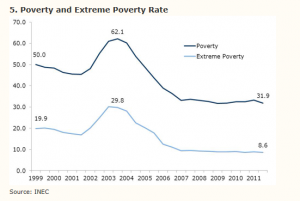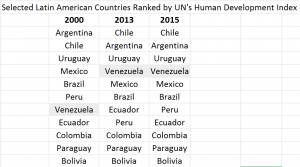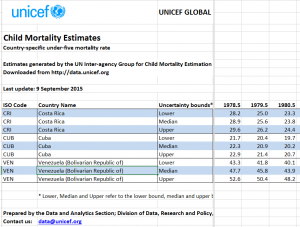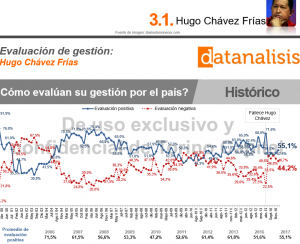Reuters used to occasionally push back – albeit timidly – against what other corporate outlets reported about Venezuela. Now it appears to have given up making any effort at all to break from the corporate pack. This article “No visas, bad jobs: Venezuelan emigrants reluctantly return home” is an example.
Consider this excerpt:
For decades after World War II, Venezuela’s flourishing oil economy made it a destination for mass immigration from southern Europe, with Portuguese bakeries and Spanish bars a common sight across Caracas.
But during 18 years of Socialist rule, an increase in crime, economic decay and political protests have prompted emigration to Miami, Madrid, and the rest of Latin America.
Sociologist Tomas Paez estimates over 2 million Venezuelans have left the country of 30 million, accelerating in the last two years as the OPEC member’s recession has worsened, leading to shortages of vital medicines and food, runaway inflation and lack of formal jobs.
Eighteen years ago, in 1999, Venezuela had an income poverty rate of 50%. Its human development index ranked seventh among Latin American countries despite the fact that its GDP per capita was second in the region. Even in the late 1970s, when Venezuela’s GDP per capita was at a historic high, its child mortality rate was about double Cuba’s and Costa Rica’s. In other words, during decades when it was not targeted for overthrow by the United States, considerable poverty and injustice existed in oil rich Venezuela but was (and is) of zero interest to the corporate media. Reuters really did an Orwellian summary of Venezuela’s economic history, and that just scratches the surface of the dishonesty in this passage quoted above.




During the initial years of “socialist rule” (when Hugo Chavez and his allies began a long winning streak in free and fair elections) poverty increased (to 60% by 2003) despite the oil price boom that began in 1999. The reason was a US-backed military coup and opposition supported shut down of the oil industry on which Venezuela depends. The “sociologist Tomas Paez” whom Reuters cites above signed an open letter that was published in a Venezuelan newspaper (El Nacional) that enthusiastically “welcomed” the dictatorship of Pedro Carmona which (no doubt to the dismay of Paez) only lasted two days. By checking against World Bank (and US Census Bureau) data, Paez’s emigration estimate appears to be double the actual number. Moreover, some of the wilder claims that have been made about Venezuela by the international media [more dangerous than Iraq (New York Times), infant mortality of 30% (Al Jazeera) ] would result in emigration of millions per year – not 1 million over an 18 year period.
By 2013, when Chavez died, income poverty was cut by half and extreme poverty by about 70%. Venezuela’s human development index rose to 4th in Latin America. After defeating the attempts to violently drive it from power and, crucially, after getting control of state oil company, living standards improved dramatically. The drastic fall in oil prices in late 2014, combined with the government‘s mistakes, led to a depression.
Reuters leads its readers to believe that Venezuela was “flourishing” until “socialist rule” disrupted the prosperity. The facts tell a drastically different story. That explains why in June of this year, an opposition-aligned pollster, Datanalisis, reported that the late Hugo Chavez had an approval rating of 55%, higher than any other Venezuelan politician.

Then there is this passage:
Colombia, which shares a porous border of some 2,219 kilometers with Venezuela, has estimated that about 36,000 Venezuelans enter daily, and that some 2,000 do not immediately return to their country.
A Colombian university study estimated that about 80,000 per year over the last two years have come to live in Colombia – about 200 per day – which is one tenth the estimate Reuters insinuated into this article.
Of course, if a Reuters reporter decided to stand out from the pack, to really push back against the rest of the corporates media on Venezuela, then he or she would soon be looking for another job. That’s especially true when the western establishment really decides to pile the pressure on a US target.
ZNetwork is funded solely through the generosity of its readers.
Donate

2 Comments
Thanks very much Guiseppe.
Could you pass me that paper you mention jemersberger@aol,.com
Dear Joe I have been studied the Colombo -Venezuelan migrant corridor . The real number of Venezuelan ( excluding those Colombian with Venezuelan citizenship , or Colombian of second generation both categories confused in many studies and media in Colombia with Venezuelans is as follow : 85.000 with special permission ( Permiso especial de permanencia) and cedula de ciudadania plus 9.000 with residence, 30% of these Venezuelans are married with Colombians We are talking of 0,19% of the population of Colombia. In Venezuela there are officially 1.000.000 of Colombians ( between 32-57% according to Wordl Bank and Venezuelan census arrived during the Chavista government. Between 2004-2010 the Chavez government legalized 998.118 Colombians. The number of Colombians of second and third generation living in Venezuela is around 2.5 millions . But the estimates of Colombian in Venezuela is greater around 4 million , maybe 1.2 million arrived after 2001 . In Petare ( municipio Sucre) a huge slum in Caracas the Venezuelan census 2011 registered 44.000 Colombians the data of the municipality (in the hands of opposition) has 200.000 register a so on. All these data and more is in a paper called : Un Siglo de emigración colombiana hacia Venezuela : Impacto demográfico y económico under review at the Revista de Historia Economica – Journal of Iberian and Latin American Economic History. The real history is that there was a huge, a massive emigration of Colombian to Venezuela from 2000-2015, 80% looking for employment, 15% because they already have family in Venezuela and 5% due to violence. Cordially yours Prof. Giuseppe De Corso